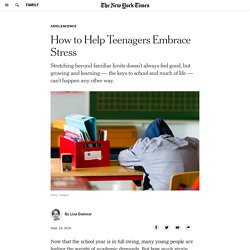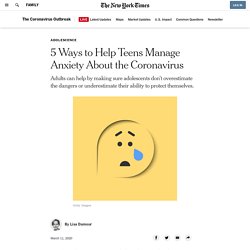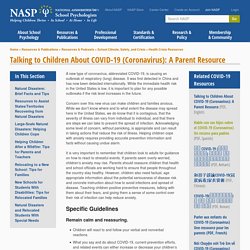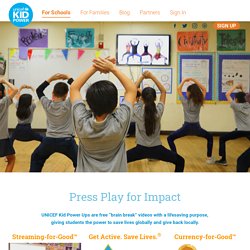

Research-Based Strategies for a Calm & Connected Classroom. School at Home: Kids Share Experiences During Coronavirus Pandemic. Life without school is much more boring then I thought it would be.

Without the summerlike feeling of no work and being able to see friends, it’s actually very depressing. — Una Hoppe, 14, Beacon, N.Y. It’s really easy to get distracted at home. I like going to school and using the time at school to do schoolwork. Now all schoolwork is done at home, so my brain thinks there’s more homework because my brain hasn’t adjusted to staying home the whole day. How to be Happier During COVID: Decades of Science Shows That Gratitude, Love, and Connection Can Save Your Life. With no vaccine or drug that reduces symptoms readily available to help the body combat COVID-19, social distancing and self-isolating is one of the most effective measures of prevention to ensure that hospitals don’t become overwhelmed with sick patients.

But the methods most readily available to help reduce the stress and anxiety resulting from seriously difficult times—an embracing hug, seeing friends, or visiting parents or grandparents—are exactly the things we’re told not to do. There are other options, however—and over 50 years of documented research suggests that we can reduce symptoms of anxiety, and even physical pain responses, by doing them.
In a meta-analysis looking at a half-century of research, scientist found that both the act of smiling and seeing smiles can actually make people happier. Try it right now for yourself. Written in Our Biology CHECK OUT: Doing Something Nice For Others Can Immediately Relieve Sensations of Physical and Mental Pain, Says New Study. COVID-19 Resources. Supporting Middle Level Educators through COVID-19 During this unprecedented time, educators are being asked to support their students and school communities while adapting to an entirely different way of teaching almost overnight.

This can be especially challenging when working with young adolescents, who are already going through a transformative time of development. At the same time, we know the power of AMLE members to support one another and share resources that are working well to keep our students on track, both academically and personally. PenPal Schools - A Global Project Based Learning Community. How to Help Teenagers Embrace Stress.
Happily, studies also find that it’s not hard to convert people to the stress-is-enhancing perspective.

To do this in my own work with adolescents, I liken the demands of school to a strength-training program. Everyone understands that lifting weights to the point of discomfort is the only way to build muscle; the process of developing intellectual ability, including the ability to manage the stress that comes with it, works just the same way. In talking with teenagers, I matter-of-factly point out that their teachers should be giving them hard academic workouts, because that’s what will transform them from wobbly middle school colts into graduation-ready racehorses. 5 Ways to Help Teens Manage Anxiety About the Coronavirus.
People of all ages are concerned about the spread of the coronavirus, and teenagers, as a group, tend to experience emotions especially intensely.

If you are raising, teaching or otherwise caring for an adolescent who is feeling very nervous about it, here are five things you can do. Anxiety can be healthy. But not all adolescents, or adults, know that it typically acts as a useful and protective emotion. Accordingly, teenagers sometimes fear that their heightened nerves signal the onset of a full-blown anxiety disorder. They become worried about the fact that they are worried. Adults can help young people appreciate that healthy anxiety has a purpose: It alerts us to potential threats and helps us move toward safety. Helping Children Cope with Coronavirus and Uncertainty. Talking to Children About COVID-19 (Coronavirus): A Parent Resource. A new type of coronavirus, abbreviated COVID-19, is causing an outbreak of respiratory (lung) disease.

It was first detected in China and has now been detected internationally. While the immediate health risk in the United States is low, it is important to plan for any possible outbreaks if the risk level increases in the future. Concern over this new virus can make children and families anxious. Talking to Kids About the Coronavirus. Explaining the News to Our Kids. How to Talk to Kids About Difficult Subjects. Inspired Proficiency - Special Edition #Covid19WL Episode. Spielberg Graphic Why We're All Feeling Stress. Spielberg Challenge Be a Self Starter at Home! COVID-19 Advisory Activities. Daily schedule planner - Go to File Menu. Distance CheckIn. Good News, Inspiring, Positive Stories - Good News Network.
What is UNICEF Kid Power? Choose from nearly 100 videos, from dance and yoga to lessons that integrate social-emotional learning (SEL).

New videos added each month! You can select your classroom favorites and also share videos with others. Kid Power Ups feature music and people your students know and love, such as WWE Superstars! Empower students to make a difference while learning about teamwork, empathy and the world around them. Being Mindful of Meditation. Character Education, Social Skills, Classroom Management, Bullying Resource.